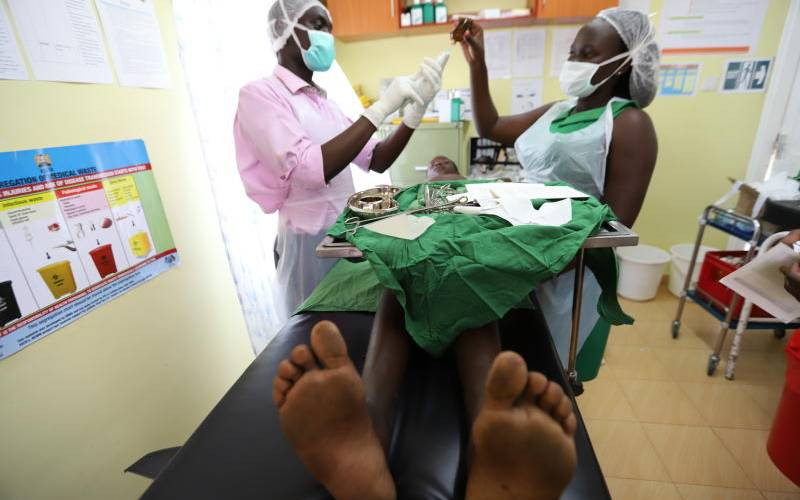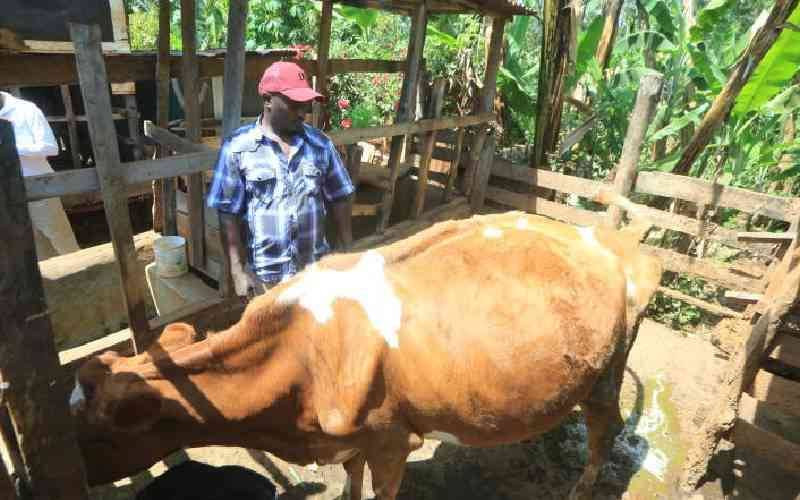Nyanza HIV crisis: Culture and silence fuel new infections

[File, Standard]
Many people were shocked when both print and broadcast media reported high rates of HIV/Aids infections in Nyanza. An unusually startling revelation was that in Kisumu County; 11.7 per cent of the population is HIV positive. Furthermore, a huge number of women are affected.
However, some well-informed people were not shocked by the figures and revelations. This is because Nyanza became one of the regions hardest hit when HIV/Aids moved from Uganda to Kenya in the 90s, often brought by women who crossed over to Kenya to seek employment in entertainment joints in the region.
Women, mostly from Uganda’s Gisu community, who became barmaids, were linked to the rapid spread of HIV/Aids across Nyanza and Western Provinces, as fast and destructive as wildfire in savannah grasslands. This trend should concern all stakeholders, including health professionals, community elders, chiefs, county leaders, professionals and religious figures. It is important to take practical steps to educate residents on avoiding cultural practices, lifestyles and behaviour that fuel the spread of the disease.
Outdated cultural practices such as wife inheritance remain deeply rooted, often viewed as the best options in communities where men die and leave behind young, sexually active widows. However, this tradition must be examined in light of modern realities and the risk of Sexually Transmitted Diseases (STDs). If it must continue, it should be modernised by encouraging condom use, mandatory medical check-ups, or even promoting abstinence. Cleansing rituals done in the name of wife inheritance should be discarded altogether for the sake of public health.
It is troubling — and shameful — that grandmothers over 75 years are contracting HIV/Aids after being briefly inherited in the name of cleansing. Even more distressing is the silence of medical professionals from Nyanza, who watch helplessly as their relatives, friends and clan members engage in practices that fuel the spread of HIV under the guise of preserving Luo cultural traditions.
“All these must stop immediately. We, as elders, elected leaders, clergy, and county administrators, must make it clear to women that nothing will happen to them if they are not inherited,” says one member of Luo Council of Elders, Rarieda branch. “Wife inheritance must be voluntary, not forced,” he says. However, during their Annual General Meeting (AGM) in Nairobi, members of the Kabiero Welfare Association made a misleading claim, suggesting that HIV/Aids no longer kills because the human body has undergone mutations and the virus is no longer effective. This kind of misinformation poses a serious risk to public health. Such statements are sadly common amongst some communities around the lake region, yet they are dangerously misleading. They promote unprotected sex and continue to harm lives. A visit to Ward 7 and Ward 8 at Kenyatta National Hospital reveals the painful reality—patients on their final struggle against HIV/Aids. In 2022 alone, more than 18,000 people died from the disease and more than 20,000 in 2023. With global funding for HIV/Aids, tuberculosis and malaria steadily declining following the withdrawal of US health aid under President Donald Trump, there is growing concern that more lives will be lost to preventable illnesses.
Since the first case of HIV/AIDS was reported in Kenya 41 years ago, women have consistently recorded higher infection rates than men. Several factors contribute to their increased vulnerability. While Kisumu often draws attention, it is not the only region bearing the brunt of rising infections. In hospitals like Homa Bay, up to 50 per cent of both inpatients and outpatients are treated for HIV-related illnesses, with nearly 70 per cent of bedridden patients in the final stages of the disease.
But why are women more vulnerable to HIV/Aids? Experts warn that gender discrimination hugely increases their risk. According to a report by UNICEF, women and girls are disproportionately affected by the disease. In conflict zones, rebels often abduct them and subject them to sexual exploitation, forcing them to serve as sex slaves, cooks and ‘wives.’ The report further notes that women and girls often lack the power to negotiate for protection or safe sex, making them more vulnerable. Additionally, gender-based violence has been closely linked to the continued spread of HIV/Aids.
“In many clans around the Lake region, even mentioning the word ‘condom’ can lead to a woman being labelled as promiscuous, unfaithful, or even a prostitute,” says Dr Joseph Aluoch, chairman of the HIV Clinicians Society of Kenya. For many semi-literate women in rural areas, initiating condom use remains a major challenge. Gender disparities in HIV infection rates are especially stark among the youth, particularly those aged 18 to 30. Doctors report that between one-third and two-thirds of known sexual assault victims are girls aged 15 or younger, further exposing them to the risk of infection. The same girls and women at high risk of HIV/Aids also shoulder the burden of caring for infected loved ones. “The rate of HIV/Aids infections in parts of Nyanza is alarming and should concern health professionals, policymakers and the public,” says Dr Aluoch, who is also a medical consultant at Nairobi Hospital.
Many people continue to suffer in silence due to the stigma surrounding HIV/Aids. Fear, shame and discrimination only worsen the crisis and fuel new infections.
There is an urgent need to develop fresh strategies that expand educational programmes promoting behavioural change, especially in regions such as Nyanza. Investing in poor communities is key to tackling these challenges. Empowering women and girls, through targeted support, funding their initiatives, and backing projects that address their specific needs, can make a meaningful difference in the fight against HIV/Aids.
Want to get latest farming tips and videos?
Join Us













